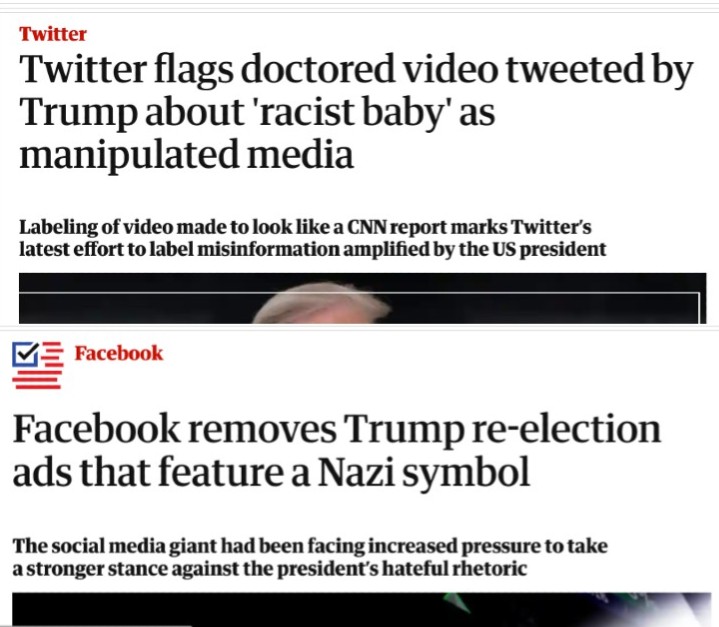People sitting inside President Trump’s campaign right now must be laughing.
If they produce something outrageous and push this out through their social media channels, then they seem always to be able to “win”.
On a normal day, the content goes out to the audience of supporters they have built up over recent years, and they have done their regular job.
But on a good day, the content gets picked up as being controversial and reaches many more people in a major news cycle.
Once the controversy has started, then much of the attention turns to how Facebook and Twitter will treat the content.
Their outrageous messages get effectively (if unintentionally) distributed for free to a much wider audience than the normal social media crowd.
And the loudest criticism people hear seems to be directed towards the platforms rather than the originators of the content who are granted a ‘boys will be boys’ free pass.
This is how the calculation looks from the perspective of a campaign :-
If the platforms leave the content alone, then this will create huge angst amongst your political opponents (plus you have had the extra reach from the media storm);
But if they restrict the content, this will allow you to play the victim and fire up your political supporters (and the increased reach from the media storm will anyway outweigh any decrease in reach from platform restrictions).
It is heads you win, and tails you don’t lose.
This is beyond frustrating if you believe that this kind of content should be driven out of the political discourse as far as possible, instead of it being allowed to take centre stage.
So what can and should be done to challenge rather than boost political content that goes beyond what is acceptable even in a robust partisan debate?
Most importantly, the conversation should be about why something is unacceptable with a view to developing as broad support as possible for that position.
Other considerations such as whether individual platforms did or did not take actions on the content are a distraction.
We can take two stories that are being discussed today as examples of how the current treatment works.

In both cases, the headlines lead with the names of the tech platforms and the stories are framed around actions taken by the platforms.
The stories do talk about why the content is problematic in each case but this feels almost secondary to the interest being shown in the platform actions.
So what kind of treatment do I think would be better?
- The reasons for the content being problematic should be front and centre; and
- The discussion should be about what is acceptable in political discourse writ large rather than being about platform rules.
HEADLINE: Trump campaign causes outrage with doctored video
“We are interested in this content because a political campaign has faked a video to look like a real news report.”
Wow. That sounds really important, let’s not get distracted and lose it.
“Let’s get the views of some experts about the problems with this kind of material being circulated, and the damage it does to public trust and why this is harmful to us all.”
This is interesting. I happen to support this campaign, but hadn’t really thought about how this could be harmful before.
“The big question for you is whether it is ever acceptable for political campaigns to distribute videos that pretend to be from known news brands but are actually faked?”
Hell, no. No campaign should do that – this has crossed a line even for rough campaigns.
“And by the way, as a footnote, platform A took this action, while platform B did something else.”
Sure, fine, I guess they will do what they do, but what’s important is for the campaigns to stop producing this kind of stuff.
As I write this, I can see the risk of coming across as ‘tech guy telling journalists how to do their job and distract from tech company problems’.
Maybe. But this challenge of how to treat outrageous political claims is now also roiling classic media, so I prefer to think of it as a shared challenge.
There is an opportunity to reestablish reasonable norms around speech in political campaigns.
But this will only happen if bad speech leads to bad days for campaigns.
As long as campaigns feel that ratcheting up their messages is a bet where they cannot lose, then they will keep doing it.
And if social and classic media platforms spend their time talking about themselves and each other rather than focusing on the questionable speech then they will not make progress.
Rant over.
This blog is just gold dust. Draws on such deep experience! I guess some politicians have always drawn on the unsavoury parts of human behaviour. But heavens above these platforms have created some huge and intractable challenges…